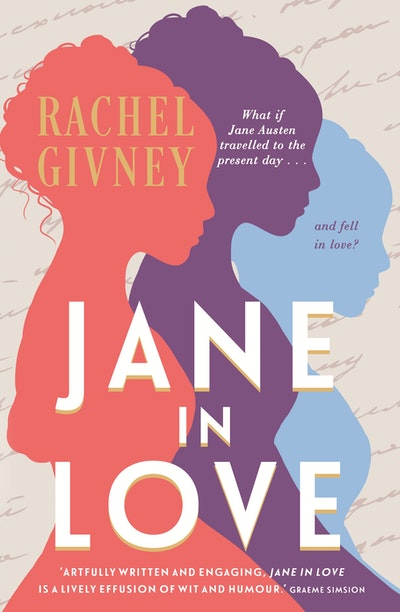- Published: 4 February 2020
- ISBN: 9780143794097
- Imprint: Michael Joseph
- Format: Trade Paperback
- Pages: 416
- RRP: $32.99
Jane in Love
Extract
PART ONE
CHAPTER ONE
As Jane climbed over a hedge and landed in a pool of mud, some of which flew upwards and came to rest on her boots, gown and face, she paused for a moment, pondering whether behaviour like this might be the reason she struggled to find a husband.
The fact that she wandered through some farmer’s turnip paddock at eight o’clock in the morning did not alone make Jane consider ineligibility for marriage to be her greatest talent. As she leapt over a stone fence and into another field – less of a field, in fairness, and more of a quagmire (Why did she always end up in the dirtiest fields in England? Did mud seduce her?) – she compiled a list of all the ways in which her character could be considered unmarriageable.
She preferred a good book to an assembly and liked to wander the countryside alone for hours. The neighbours all agreed these were suspicious traits for a woman to possess. Jane also destroyed hairstyles at the same rate she muddied dresses. Her fawn curls, commanded into a Grecian knot on the crown of her head by her mother earlier that morning, now rested below her left ear in a disappointed bundle. These facts alone ruled her from contention for any prospective husband.
But as well as the scandalous affectations of reading, walking and hairstyle-assassinating, Jane possessed one marriage-deterring peccadillo which put all others to shame.
She wrote things.
Not letters and poems, though she had talent for both. Novels were Jane’s canvas. A germ of a story would come to her, in the woods or during an assembly, and she’d toil and rage to tease the seed from its pod. She’d walk around in a funk, unable to put her mind to any other task until she wrote it all down: until sisters were reunited, villains dispatched, lovers married. Once finished, she’d drop her quill and fall asleep with an empty head, her voice added to the dream of the world. She’d wake the next morning with a new idea bothering her, and the toil would begin once more, its importance for her on par with breathing.
As an accomplishment, writing did not equal embroidery or watercolour, but at least it displayed neat handwriting. This had once endeared her to her family. She also told crude and diverting stories, of which everyone approved, and which were as pleasant a way to pass the time before dinner as any. But as each year passed and she remained unmarried, the habit went from a harmless folly to the culprit for her failure in life; ladies did not write books.
No one published Jane’s work. When she was nineteen, her papa, filled with fatherly pride, sent one of her novels to the publisher Thomas Cadell in London, even offering to cover the costs of printing himself. The family waited with joyous anticipation at the prospect of seeing the Austen name in print, and after several weeks, the letter was answered by Cadell, ‘declined by return of post’. The quality of Jane’s writing did not even deserve a written rejection. George Austen never approached a publisher again, and Jane hid the manuscript under the floorboards of her room.
But despite the rebuff and declaration that her talent did not exist, Jane found herself unable to stop writing. Lady writers did exist, but as oddities, outcasts and degenerates. Ann Radcliffe, Jane’s idol, published five novels, but people knew her more for being barren. With stories such as these the guide to what the future might hold for Jane, her mother declared one Tuesday afternoon that if she ever caught Jane writing anything but a shopping list again, she would set it on fire.
From that day on, Jane wrote in secret. She kept up her hobby, concealing it from the world. She scratched her thoughts onto scraps of paper in the woods, then collated everything later while Mama was out of the house.
Jane had walked the woods and groves above Bath since dawn, ruminating on these topics. She did so for a specific reason: Mr Charles Withers, a young gentleman, and his father would come to the house in less than an hour to call upon Jane.
Jane had never met Mr Withers before, but she understood the importance of his call. It had once felt as though a new gentleman visited the house every other week to inquire after Jane. That was when she was twenty. She had now reached twenty-eight, and no man had called on her in seven months. She was resigned to the fact that one might never call on her again.
Jane needed a husband for two reasons. First, if she did not acquire one, she would become a spinster and then perish, as her mama informed her daily. Jane held the grand title of the second-oldest unmarried woman in the West Country, besides her own dear sister, and Cassandra only remained single because her fiancé had passed away. Jane had no such excuse. The older she grew, the more piteous looks she collected from friends and family, and pity induced few men into marriage. If she reached thirty years of age, still unwed, all would be lost.
Jane’s second reason for marriage involved her finances. Once her parents exited God’s earth, her father’s meagre assets would pass to his eldest son, James, and Jane would fall upon the fiduciary mercy of her brothers: the rich ones who did not care for her and the poor ones who did. Alternatively, she could earn her own income by selling flowers, washing clothes or becoming a pirate.
A third reason existed for Jane wanting a husband: more of an idle want than a reason, a feeling of such silliness she dared not mention it to anyone.
It was love.
But as she reminded herself daily, love was a luxury for a woman in her position, and whenever this third item returned to her mind – persistent little annoyance that it was – she pushed it out of her brain. It did no one good to mull over wishes.
She pushed it away again now as she leapt over a boxwood hedge and into the next field. The mud splatter now reached above her middle, while a piece of hedge rested in her hair. She performed an excellent impression of a speckled egg. Measures needed to be taken to ensure the best possible chance of securing this Mr Withers as her husband. Nothing could be done about her poverty or age, but if she could conceal her true nature, at least for an hour, she might have a small chance.
Jane fetched a quill and a scrap of paper from her pocket and compiled a list.
Silence appeared to be an excellent tactic. She wrote that down. Her cleverness disquieted. If forced to communicate, she’d restrict her comments to the weather or, better still, perform feminine noises in his general direction.
Smiling was also a virtue in this environ. When she was thinking, her face tended to fix itself in a scowl. Ahh. She added ‘No thinking’ to her list.
With her directives complete, she placed the scrap of paper in her pocket and left the fields of Somerset. She sighted the spires of St Swithin’s church and returned to the edge of Bath, already late. As she stepped onto the cobblestones, Jane spotted the back of an old man with white hair. ‘Papa, what business have you in this part of town?’ she asked, pushing the paper further into her pocket.
Her father turned, his blue eyes shining. ‘I was sampling the fine Somerset air,’ he said. ‘I must have lost my way. Will you escort an old man back to his house?’
‘With pleasure,’ she replied, taking his arm and patting it. Years of preaching in freezing churches had ruined his spine – he could not walk more than fifty yards without cursing – so Jane knew he had not been taking a stroll, but had come to find her, probably to make sure she did not deteriorate in a field somewhere.
He did not rush her, nor say anything about their upcoming appointment with Mr Withers. Her father’s age surpassed seventy, but he remained as handsome as in his portrait as a young parson. His long white hair was tied back with a ribbon of duck-egg blue that Jane had bought for him on a trip to Kent. He rarely wore it, claiming it too nice to spoil with everyday wear, and Jane was hurt more than she let on. But he wore the ribbon now. Jane sensed he did it to win her favour that morning, and he succeeded.
As Jane and her father made their way back to the house, they passed the Pump Room on Stall Street. Giant honeystone columns soared into the air at the grand building’s entrance, welcoming people as though they were entering a Grecian temple. A woman cloaked in an emerald pelisse paused before them and turned her head up at the building’s facade with reverence, as though she was sending up a prayer. Jane scowled. Performances like this happened often in Bath, for the Pump Room was indeed a church, deserving of worship. Aside from the tea-taking, sacred water–imbibing and intrigue that went on there, some of the most spectacular marriage contracts in England had been agreed in its assembly room. Jane never went inside; as a single woman, rapidly ageing, she was welcomed by its guests with the same reception they might offer a leper.
Jane did not entirely love the town she lived in. Her parents had moved there upon her father’s retirement from the church, uprooting their comfortable life in a country parsonage in Hampshire. Jane’s parents claimed the benefits to her father’s health had prompted the move west – every neighbour and newspaper raved about the healing properties of Bath’s spa waters – but Jane suspected another reason. George and Cassandra Austen had themselves met in Bath, and with two daughters speeding towards spinsterhood, they had relocated their family not to improve Reverend Austen’s digestion, but for one last-ditch attempt to marry off their female children. Where else to make these happy events occur but Bath, the marriage capital of England, and the place where her parents themselves had wed. In the move to Somerset Jane observed no changes to her life but one: where green fields and quiet once filled her days, now fog and gossip replaced them.
Still, she could not abhor Bath completely. After all, without its scandal and silly people, its intrigue and nonsense, she might have nothing to write about.
Jane stepped around the woman in the green coat who continued to pray to the Pump Room and avoided her eye. At least Jane was not as odd as she – or so she hoped.
Jane in Love Rachel Givney
Jane Austen time-travels to the future and falls in love. But will she choose happiness in the present, or her career as a writer in the past?
Buy now












